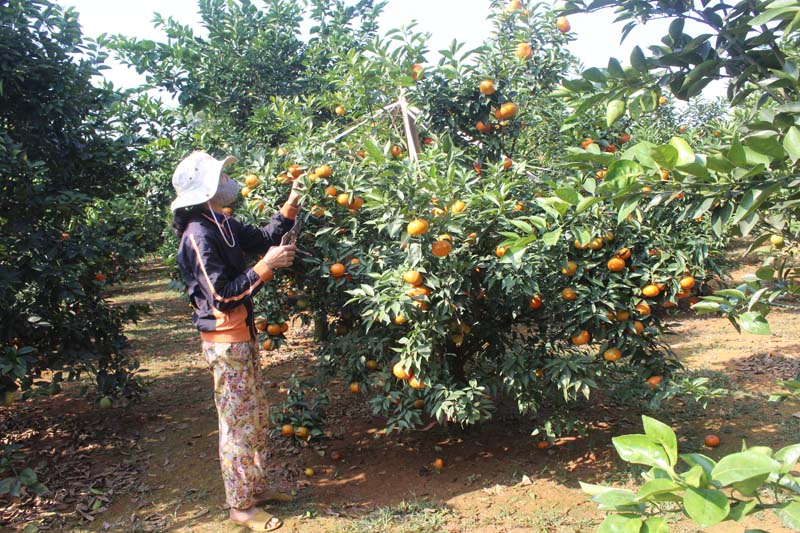
(HBO) - Over the past years, the Government's preferential loans through the Social Policy Bank channel has accompanied with the farmers in An Nghia commune (Lac Son) in sustainable poverty reduction, contributing significantly to the construction of the local New Rural Area.
With the care and investment of the State,
for many years, the local people have access to various loans, of which, preferential
loans from the Social Policy Bank are the driving force for production
development, hunger eradication and poverty reduction and to become rich. So
far, the average income in the commune has reached at VND 27.5 million /
person; the poverty rate reduced to 11.2%.
With preferential loans from the Social
Policy Bank, farmers in Vo village, An Nghia commune (Lac Son) have invested in
citrus trees for high economic efficiency.
At present, An Nghia commune has implemented
9 policy credit programs with 795 poor households and policy beneficiaries with
loans, the total outstanding loans is over VND15.6 billion with 23 savings and
loan groups. To grant preferential loans to the right beneficiaries, the
associations and trustees of the Social Policy Bank to guide the group
officials, the staffs of savings and loan groups to strictly follow the process
and steps to entrust the loan. At the same time, they always create favorable
conditions for members to participate in training courses on transferring science
and technology on husbandry, cultivation, capital management methods, etc. Many
members have changed their thinking, doing, converting the form of production
and business, gradually improving and raising the standard of living life for
families.
The Chairman of the People's Committee
of An Nghia Commune Mr. Bui Van Huan said that the preferential credit has been
affirmed as an effective tool of the Party and the State in implementing the
national target program on poverty reduction, job creation, social security and
active contribution in socio-economic development in the area. From 2013 up to
now, the whole commune has planted 48.42 hectares of oranges, lemons and
grapefruit. In general, the local people have brought into full play the
effectiveness of the capital source, exploiting the strengths of the commune
and bringing about economic efficiency, stable incomes and improvement of
living standards.
The Department of Education and Training of Hoa Binh province held a conference on March 18 to review the performance of the "Safe and Happy School" Project and set out tasks for 2025. The project, funded by the Taiwan Fund for Children and Families (TFCF), aims to create a safe, inclusive, and supportive learning environment for students. The event saw the attendance of representatives from the TFCF and 26 beneficiary schools.
With over 70% of their workers being women, trade unions across industrial parks (IPs) in Hoa Binh have been actively safeguarding their legal rights and interests while implementing initiatives to improve their income and well-being.
In recent years, the Hoa Binh provincial General Hospital has continuously innovated itself and improved the quality of medical services to meet the increasing needs of local people. With substantial investments in infrastructure and modern equipment, along with a team of highly qualified doctors and nurses, the hospital has gradually established itself as one of the leading medical units in the Northwestern region and a trusted destination for healthcare for people inside and outside the province.
From mastering the fundamentals of programming to achieving national recognition, the Programming Club of the Le Van Tam Primary School (STAR LVT28) in Hoa Binh city has made remarkable strides in the field of robotics.
The Ho Chi Minh Communist Youth Union Committee and the Vietnam Youth Federation chapter of Hoa Binh province organised a programme on March 12 to launch the "Digital Literacy" movement and an online quiz on the resolutions of the Vietnam Youth Federation congresses at all levels, as well as the Politburo's Resolution No. 57-NQ/TW on breakthroughs in the development of science, technology, innovation, and national digital transformation.
As climate change grows more unpredictable, the development of production forests has become essential - not just for economic growth, but for safeguarding the environment and maintaining ecosystem balance. By boosting local incomes, curbing natural disasters, preventing soil erosion, and protecting water resources, these forests play a crucial role in sustainable development.



